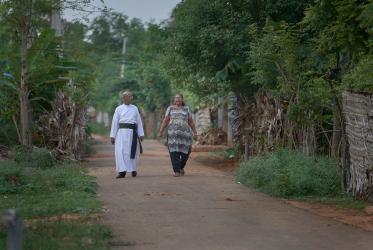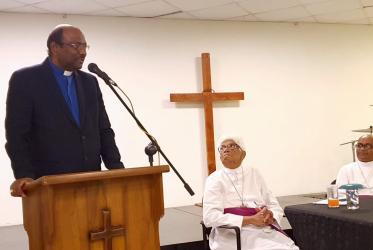Hosted by the National Council of Churches in Sri Lanka, the seminar gathered around 30 church representatives, including Indigenous women and young theologians and practitioners. The event took place in Colombo in a hybrid format from 25-27 October.
Athena Peralta, WCC programme executive for Economic and Ecological Justice, highlighted the seminar's three key questions: the relevance of spirituality for climate adaptation, its contribution to resilience-building, and the implications for church, community, and policy responses.
The seminar emphasised the often-overlooked role of spirituality in adapting to and building resilience against the escalating climate crisis. Indigenous spiritualities, such as the Pudong spirituality in the Philippines, establish sacred connections among and within creation. Lori Ransom, WCC Indigenous Peoples Consultant, emphasised the profound concern of Indigenous communities for climate justice. Rev. Dr Neddy Astudillo highlighted the interconnectedness of the human story with nature.
“It was indeed a great learning experience where we were able to spend time with experts from the world who shared their expertise with all who were present,” said Rev. Sujithar Sivanayagam, general secretary of the National Christian Council of Sri Lanka.
Concrete practices: sowing sustainability
Eco-spiritualities inspired practical actions worldwide, from Ma'ano and Babulu food and economic security practices in Maluku, Indonesia, to the Sia and Nainu methodologies of the Guna people in Panama and forest churches in Ethiopia. These practices aim to minimise greenhouse gas emissions, restore ecosystems, and enhance social cohesion in responding to climactic disasters.
Frances Namoumou from the Pacific Conference of Churches stressed the crucial role of churches in accompanying communities impacted by climate change. Secular climate projects often fall short when they neglect communities' spiritual values. Recognising the sacred threads binding people to the land and the sea is imperative for effective climate responses.
Indigenous participants highlighted the need for policymakers to ensure land rights for Indigenous communities and recognise Indigenous spirituality and knowledge in crafting solutions to the climate crisis.
A call for hope: a holistic spiritual response
Rev. Tuomas Meurman from the Finnish Evangelical Lutheran Mission posed a poignant question: Can spirituality be the holistic answer to the complex challenge of climate change? He emphasised the necessity of a spirituality of hope grounded in actions and commitment to a new way of life.
In conclusion, the seminar showcased the potential of spirituality to inspire meaningful, sustainable action. The sacred connections championed by Indigenous communities serve as a guidepost for a more harmonious and resilient future in the face of a climate emergency.





